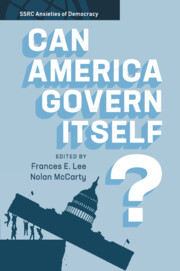Book contents
- Can America Govern Itself?
- SSRC Anxieties of Democracy
- Sponsored by the Social Science Research Council
- Can America Govern Itself?
- Copyright page
- Contents
- Acknowledgments
- 1 The Anxieties of American Democracy
- Part I Anxieties of Power, Influence, and Representation
- Part II Procedural Anxieties
- 7 Does Regular Order Produce a More Deliberative Congress?
- 8 Congress at Work
- 9 Dumbing Down?
- Part III Anxieties of Governance
- Index
- Index Authors
- References
9 - Dumbing Down?
Trends in the Complexity of Political Communication
from Part II - Procedural Anxieties
Published online by Cambridge University Press: 25 May 2019
- Can America Govern Itself?
- SSRC Anxieties of Democracy
- Sponsored by the Social Science Research Council
- Can America Govern Itself?
- Copyright page
- Contents
- Acknowledgments
- 1 The Anxieties of American Democracy
- Part I Anxieties of Power, Influence, and Representation
- Part II Procedural Anxieties
- 7 Does Regular Order Produce a More Deliberative Congress?
- 8 Congress at Work
- 9 Dumbing Down?
- Part III Anxieties of Governance
- Index
- Index Authors
- References
Summary
Commentators and some political scholars claim to have observed a “dumbing down” in the level of sophistication of political language, leading to anxiety over the quality of democratic deliberation, knowledge, policy design, and implementation. This work typically focuses on the president’s State of the Union addresses. Using quantitative indicators of textual complexity, we measure trends since 1790 in that and other key political corpora, including rulings of the Supreme Court, the Congressional Record, and presidential executive orders. To draw comparative lessons, we also study political texts from the United Kingdom, in the form of party broadcasts and manifestos. Not only do we cast shade on the supposed relentless simplification of the State of the Union corpus, we show that this trend is not evident in other forms of elite political communication, including presidential ones. Finally, we argue that a stylistic—rather than an obviously substantive—shift toward shorter sentences is driving much of the variation over time we see in traditional measures of political sophistication.
Keywords
- Type
- Chapter
- Information
- Can America Govern Itself? , pp. 154 - 236Publisher: Cambridge University PressPrint publication year: 2019

